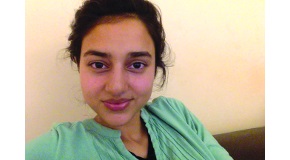
BY AFSHAN NABI (MBG/III)
afshan.nabi@ug.bilkent.edu.tr
Lessons From an Unusual Summer: Part 1
This summer, like every other summer, I visited my homeland, Kashmir. At present, Kashmir is an unusual destination for a summer holiday—in 10 weeks of protests, almost 90 people have died, most of them civilians (BBC News, September 22). I stayed for 18 days, oscillating between helplessness and outrage.The world is replete with situations that are outside our control; I would like to share what I have learned about dealing with crippling helplessness and rage in a three-part column. This first part describes Kashmir through the eyes of a Kashmiri.
The land looks so beautiful from the descending plane, laid out in shades of green so bright they make your heart flutter—this is beauty. The lighter green of rice fields bounded by straight lines, the darker green of poplars standing tall and straight like the garden fences of giants, sweeping away and across the land—the same all over and yet different, with no intentional patterns and yet striking the eye with some kind of superhuman order; this is beauty indeed.
From above, all is calm just as the universe always is; irrespective of what men do to each other, the universe moves on. Being itself, it cannot, will not stop for these people and their little lives—their alienated, trapped, cut-off little lives.
As the plane touches down, I notice a pink flower among the profuse wild green grass beside the tarmac, and a soldier with his rifle. We get our bags, unconsciously hurrying to leave the eerily empty airport. As we drive home, my father is tense, worried. There are unbelievably few cars on the road, and no buses at all. I see people walking on the roads, and surprisingly, there are as many women as there are men. I see soldiers, some who have their faces covered, some who do not; some fit and dangerous looking, others slightly overweight; all in dark uniforms, all with rifles in their hands, all looking around. I see a rainbow extending beyond the mountains after we are turned back from the first route we try. The sun is setting, lighting up the mountaintops with a fiery orange glow as we are turned back from the second route we try. The road is closed, they say. Do you want to get this car destroyed? they ask. There are several lines of sharp-edged rocks on the roads, preventing passage.
We try a third route, not another highway, but a small back road, bumpy and slow, barely wide enough for two cars to pass side by side. It is growing dark by now. Trees and paddy fields line the tiny road. There are scarecrows in the fields— caricatures of frozen men facing different directions, performing clumsy actions. We see a child laughing at us when we need to slow down to a crawl at a particularly bumpy spot, waving us on, shouting, “Go on, go on,” with delight, as only a child can. There are no streetlights, almost no other vehicles; only a few poorly lit shops with people sitting around at irregular intervals. We feel doubtful and lost, even though we aren’t lost, able to see only as far down the road as the headlights allow. The dark is so much bigger; I feel as if we are falling down a hole, being eaten alive by some huge darkness.
We reach the familiar back road that leads home, and the doubt vanishes instantly. I start to see the beauty of the landscape—silhouettes of trees line the road, beyond are fields cloaked by darkness, and the horizon is obstructed by inky mountains. There is still lightness, or rather an incomplete darkness where the sun has set, and ornately shaped clouds lie like leaden stains across it. Fill your heart with the image of this sky, my mother tells me; you will not see it anywhere else. And I agree completely; no other place I have been to so far is as intimidating, as familiar, as close to my heart and as open for my soul as this troubled valley. I wonder again, how my birth here can possibly tie me so firmly, so irrevocably to these trees, these triangular-roofed houses, to the people and all that is in this land. I wonder why I bleed when this land bleeds, and why I want it to grow, as I want myself to grow, just because I was born here.
